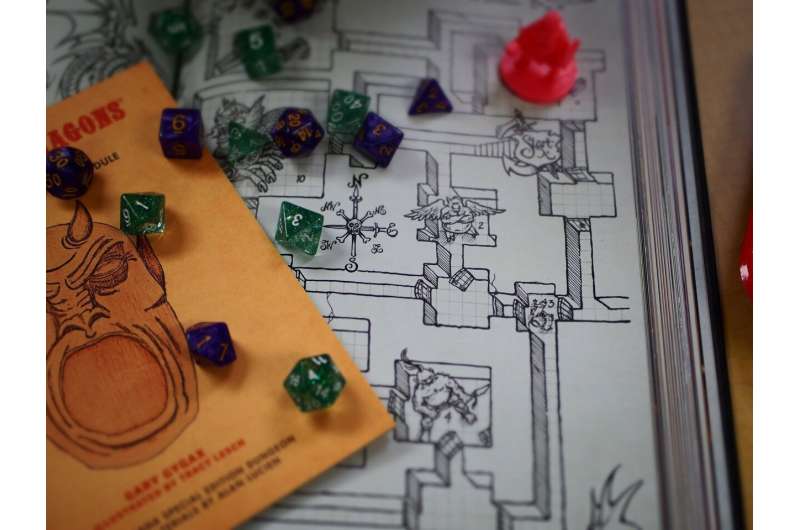
Source: Pixabay/CC0 Public Domain
Playing Dungeons and Dragons can positively support players’ mental health, a new study has found. The findings, conducted by researchers from University College Cork (UCC), pave the way for clinicians and psychologists to further explore the game’s benefits as a therapeutic tool.
Dungeons and Dragons—or D&D—is a fantasy tabletop role-playing game that has become a worldwide phenomenon. Playing Dungeons and Dragons is an inherently social activity, requiring regular group meetings over a period of months or years, and requiring creativity and cooperation from players.
After the game surged in popularity during the COVID-19 pandemic, this study examined the impact of playing D&D on the mental health of frequent players. It identified several key aspects that supported positive mental health, including escapism, self-exploration, creative expression, caring for others, social support, and routine.
The study was published in the International Role-playing Games Magazine.
Feeling like you’re in control
Orla Walsh, research leader and PhD candidate at the UCC School of Applied Psychology, said: “Our research found that players discussed the escapist benefits of playing D&D, and the positive impact this had on their mental health.
“Players reported feeling a strong sense of control in the game at times when they felt like they had no control outside of the game. While many hobbies allow for creative expression, D&D uniquely allows players to collaborate to build and inhabit worlds of their own making.”
“The social support fostered by playing D&D provides players with an emotional and social connection and a space in which they can express themselves freely. While social support is a recognized benefit of many group activities, the collaborative storytelling aspect of D&D fosters a unique sense of camaraderie and shared experience among players,” said Orla.
Using role-playing in therapy
The study suggests that D&D has significant potential for use in a therapeutic setting, as players felt more comfortable exploring problems and practicing skills in a space that was detached from the real world. Study participants reported benefits in their daily lives from playing the game, including a greater sense of autonomy and personal growth.
The findings help psychology researchers better understand the mechanisms by which this activity can have a positive impact, while providing encouragement to clinicians who already use D&D groups to support their social well-being.
Dr Conor Linehan, UCC School of Applied Psychology, said: “This study found that D&D can provide a multitude of benefits for players. While there are some clinicians and community groups currently using role-playing games therapeutically, these groups are mainly active in the United States.
“Our research suggests that a wider roll-out of such therapeutic role-play groups could be beneficial in Ireland and globally. It offers great potential to support skill development, emotional exploration, problem solving and fostering meaningful social connections.”
“The findings of this study have the potential to advance our understanding of why D&D has proven successful in therapeutic settings, and provide a foundation for understanding how the game might be used as a tool in the future,” said Dr. Linehan.
More information:
Orla Walsh et al, Roll for Insight: Understanding how the experience of playing Dungeons & Dragons affects the mental health of an average player, International Role-playing Games Magazine (2024). DOI: 10.33063/ijrp.vi15.321
Quote: Playing Dungeons and Dragons may support mental health (2024, July 16) Retrieved July 16, 2024 from https://medicalxpress.com/news/2024-07-playing-dungeons-dragons-mental-health.html
This document is subject to copyright. Except for fair dealing for private study or research, no part may be reproduced without written permission. The contents are supplied for information purposes only.
 Healthy Famz Healthy Family News essential tips for a healthy family. Explore practical advice to keep your family happy and healthy.
Healthy Famz Healthy Family News essential tips for a healthy family. Explore practical advice to keep your family happy and healthy.


